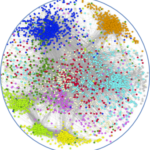Lien vers Pubmed [PMID] – 30401775
Lien DOI – e01399-1810.1128/mBio.01399-18
mBio 2018 11; 9(6):
Protozoan parasites of the genus Leishmania adapt to environmental change through chromosome and gene copy number variations. Only little is known about external or intrinsic factors that govern Leishmania genomic adaptation. Here, by conducting longitudinal genome analyses of 10 new Leishmania clinical isolates, we uncovered important differences in gene copy number among genetically highly related strains and revealed gain and loss of gene copies as potential drivers of long-term environmental adaptation in the field. In contrast, chromosome rather than gene amplification was associated with short-term environmental adaptation to in vitro culture. Karyotypic solutions were highly reproducible but unique for a given strain, suggesting that chromosome amplification is under positive selection and dependent on species- and strain-specific intrinsic factors. We revealed a progressive increase in read depth towards the chromosome ends for various Leishmania isolates, which may represent a nonclassical mechanism of telomere maintenance that can preserve integrity of chromosome ends during selection for fast in vitro growth. Together our data draw a complex picture of Leishmania genomic adaptation in the field and in culture, which is driven by a combination of intrinsic genetic factors that generate strain-specific phenotypic variations, which are under environmental selection and allow for fitness gain.IMPORTANCE Protozoan parasites of the genus Leishmania cause severe human and veterinary diseases worldwide, termed leishmaniases. A hallmark of Leishmania biology is its capacity to adapt to a variety of unpredictable fluctuations inside its human host, notably pharmacological interventions, thus, causing drug resistance. Here we investigated mechanisms of environmental adaptation using a comparative genomics approach by sequencing 10 new clinical isolates of the L. donovani, L. major, and L. tropica complexes that were sampled across eight distinct geographical regions. Our data provide new evidence that parasites adapt to environmental change in the field and in culture through a combination of chromosome and gene amplification that likely causes phenotypic variation and drives parasite fitness gains in response to environmental constraints. This novel form of gene expression regulation through genomic change compensates for the absence of classical transcriptional control in these early-branching eukaryotes and opens new venues for biomarker discovery.






